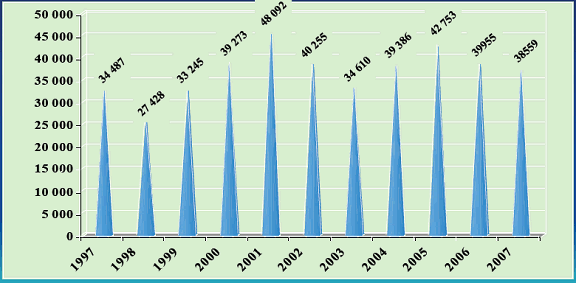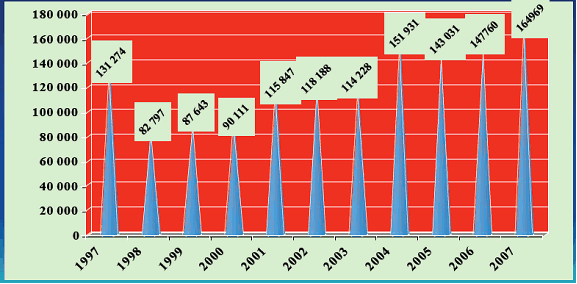 Société Mauritanienne De Commercialisation Des Produits Ee Peche (SMCP)
Société Mauritanienne De Commercialisation Des Produits Ee Peche (SMCP)
All data are collected in the Fiscal Year of 2008-2009.
Company Profile and History
The SMCP was created in 1984 and is a public company owned 35 percent by the government and 65 percent private funds. The company is the main actor in the marketing and export of fish. The company is based in Nouadhibou, the only deepwater port facilities where large trawlers and reefer cargo vessels can dock. The company contributes 4-5 percent to Mauritania’s GDP. It owns and operates 10 establishments along the coast that are EU accredited for adhering to international hygiene and safety standards.
Europe (cephalopods; demersal fish; crustaceans), Africa (small pelagic fish) and Japan (cephalopods) are the main markets for the Mauritanian processing industry.
The National Mauritanian fishing fleet includes approximately 3 600 artisanal open-deck vessels, 99 coastal fishing vessels and 153 industrial vessels, including chartered vessels. This fleet exploits the resources located in coastal waters and the Exclusive Economic Zone (EEZ). Some 270 artisanal open deck Senegalese vessels and 176 foreign industrial vessels are also licensed to exploit the Mauritanian EEZ. EC vessels operate in the EEZ under the terms of the Fisheries Partnership Agreement between the European Community and Mauritania, which covers the period 1 August 2008 to 31 July 2012.
In Country Location
B.P. 250 Avenue Median, Nouadhibou; Tel: +222 574 52 81 / 53 50; Telex: 420
Services and Products
Export of frozen fish including amongst others: Octopus, Cuttlefish, Squid, Soles, Meagre, Seabream, Goatfish, Grouper, Base, Seabass, Ray, Goldfish, Lobster, Shrimp, Porgy, Dogfish, Steenbras, Turbot, John Dory, etc.
Number of Employees
Not available
Financial Information
SMCP: Production Quantities (ton-exported by SMCP)

SMCP: Production Values (US$ thousands)

Market Share
Export of frozen products is the monopoly of SMCP since 1984.
Business Objective
“To increase commercialization of operations”
Business Model
Develop value-added operations and facilitate the integration of the income from fishing in the national business cycle; improve and expand processing and marketing activities; unify the operations of Mauritanian fishermen; and promote and develop the export of small-scale fisheries species.
Ownership of Business
Owned 35 percent by the government and 65 percent private funds
Benefits Offered and Relations with Government
The liberalization of the fishery sector started in1994, following the adoption of a sector development policy. The objective pursued by the authorities was to put in place market mechanisms to attract private. Furthermore, the Government has removed its monopoly on fishery activities, reduced its shareholding in the Mauritanian Fish Marketing Company (SMCP) to 35 percent and sold its stakes in all the joint venture enterprises in the sector.
The sector suffers from over fishing, particularly of cephalopods, and an aging and poorly maintained local fleet. In response to declining fish stocks, the Mauritanian government extended the offshore Exclusion Zone from six miles to 12 miles, improved its surveillance capacities, and extended the no-fishing biological reproduction period from 30 to 60 days (September 1 -October 31) each year. In 2008, the government introduced a second biological reproduction period from April 1 to May 31. These measures apply only to the industrial fishing fleet and not to the traditional fishing sector.
The Mauritanian government has signed a series of agreements granting fishing rights to the European Union fleet. The current agreement for 2008 – 2012, worth €305 million, permits 200 vessels from EU countries to fish in Mauritania’s EEZ. Revenues from the agreements will be used in part to improve port facilities and also to develop the fishing sector.
The Mauritanian government has encouraged onshore fish processing to increase employment and generate added value. Mauritanian exporters began exporting frozen fish in the 1980s and added additional processing stages in the following decade. There are now about 30 small and medium-sized processors, located largely in the northern port town of Nouadhibou. Processors enjoy government support, fairly easy access to land, and inexpensive manpower. They are under pressure, however, to improve standards.
The Mauritanian government has also backed a number of infrastructure developments such as the Nouadhibou port extension, warehouse development, and construction of a new harbour for artisanal fishing, partially financed by Japan.
The Ministry of Fisheries is responsible for the management and control of the fishing activities that fall under the Mauritanian sovereignty (national vessels, foreign vessels licensed to fish in the EEZ and national processing industry). The legal framework for fisheries is contained in the Fisheries Act 2000, which was updated in 2007. As far as fleet monitoring is concerned, the legal framework includes provision for granting licences to both national fleet (including artisanal fleet) and foreign vessels, logbook submission for the industrial fleet, prohibition of transhipment at sea, and a requirement for observers on board industrial vessels.
The competent authority for sanitary controls is the Office National d'Inspection Sanitaire des Produits de la Pêche et de l'Aquaculture (ONISPA). This was created in 2007 as an autonomous body. ONISPA falls under the responsibility of the Ministry of Fisheries. In August 2008, ONISPA had certified for export to EC some 98 freezer vessels and 46 processing plants. However sanitary conditions are not fully satisfactory and ONISPA is still developing the internal procedures for inspection and control.
Product Development
Nothing to report




